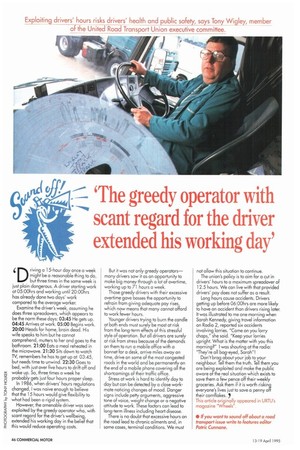'The greedy operator with scant regard for the driver extended his working day'
Page 48

If you've noticed an error in this article please click here to report it so we can fix it.
4riving a 15-hour day once a week
might be a reasonable thing to do, but three times in the same week is just plain dangerous. A driver starting work at 05:00hrs and working until 20:00hrs has already done two days' work compared to the average worker. Examine the driver's week, assuming he does three spreadovers, which appears to be the norm these days: 03:45 He gets up. 04:45 Arrives at work. 05:00 Begins work. 20:00 Heads for home, brain dead. His wife speaks to him but he cannot comprehend, mutters to her and goes to the bathroom 21:00 Eats a meal reheated in the microwave. 21:30 Sits down to watch TV, remembers he has to get up at 03:45, but needs time to unwind. 22:30 Goes to bed, with just over five hours to drift off and wake up. So, three times a week he probably gets just four hours proper sleep. In 1986, when drivers' hours regulations changed, I was naive enough to believe that the 15 hours would give flexibility to what had been a rigid system. However, the amenable driver was soon exploited by the greedy operator who, with scant regard for the driver's wellbeing, extended his working day in the belief that this would reduce operating costs. But it was not only greedy operators— many drivers saw it as an opportunity to make big money through a lot of overtime, working up to 71 hours a week.
Those greedy drivers with their excessive overtime gave bosses the opportunity to refrain from giving adequate pay rises, which now means that many cannot afford to work fewer hours.
Younger drivers trying to burn the candle at both ends must surely be most at risk from the long-term effects of this stressful style of operation. But all drivers are surely at risk from stress because of the demands on them to run a mobile office with a bonnet for a desk, arrive miles away on time, drive on some of the most congested roads in the world and be permanently on the end of a mobile phone covering all the shortcomings of their traffic office. Stress at work is hard to identify day to day but can be detected by a close workmate noticing changes of mood. Danger signs include petty arguments, aggressive tone of voice, weight change or a negative attitude to work. These factors can lead to long-term illness including heart disease. There is no doubt that excessive hours on the road lead to chronic ailments and, in some cases, terminal conditions. We must not allow this situation to continue.
The union's policy is to aim for a cut in drivers' hours to a maximum spreadover of 12.5 hours. We can live with that provided drivers' pay does not suffer as a result. Long hours cause accidents. Drivers getting up before 06:00hrs are more likely to have an accident than drivers rising later. It was illustrated to me one morning when Sarah Kennedy, giving travel information on Radio 2, reported six accidents involving lorries. "Come on you lorry chaps," she said. "Keep your lorries upright. What is the matter with you this morning?" I was shouting at the radio: "They're all bog-eyed, Sarah"! Don't brag about your job to your neighbour. Tell them the truth. Tell them you are being exploited and make the public aware of the real situation which exists to save them a few pence off their weekly groceries. Ask them if it is worth risking everyone's lives just to save a penny off their cornflakes.
This article originally appeared in URTU's magazine 'Wheels".
































































































